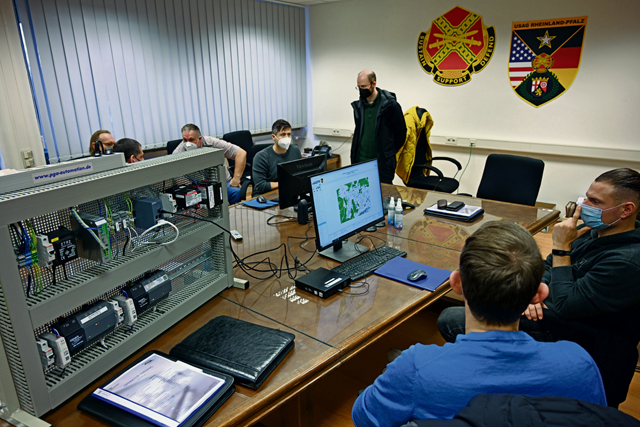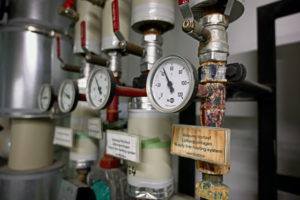Several Directorate of Public Works representatives from U.S. Army Garrison Rheinland-Pfalz gathered at Rhine Ordnance Barracks Jan. 19 to learn how to monitor and analyze data from the nearly 700 utility meters that were installed throughout the garrison over the last several months.
The training is part of the metering effort in support of the garrison-wide energy conservation effort.

“Our garrison team continues to focus efforts on developing effective strategies in reducing energy consumption coupled with meeting the needs of our communities. In reducing energy consumption through innovative technology and enhancing individual awareness, this allows us to become more efficient and effective in reaching our reduction goals,” said Deputy to the Garrison Commander Michael S. Amarosa. “These meters will assist in identifying areas with high consumption to create solutions in reducing our carbon footprint and reducing our expenditures on energy.”
According to garrison energy manager Zachary Eberbach, the Army installed the 694 “smart” utility meters in more than 450 buildings across the garrison. Eberbach said installing these meters involved extensive coordination with building tenants to access hookups and the Kaiserslautern and Baumholder Network Enterprise Centers to network every single meter.
Eberbach said the meters will monitor usage of individual garrison facilities.
“We know big picture kind of data but we don’t have building-level data, and that’s what these meters really provide.”
Eberbach said by the garrison installing the meters, DPW will find energy conversation opportunities and turn them into energy conservation measures. He said the meters will empower tenant facility managers with real-time data allowing them to compare how their building or unit is using energy against similar sized buildings and units.

He said he envisions buildings and units engaging in friendly competitions on who can conserve the most energy.
Eberbach noted that about two-thirds of the garrison’s energy consumption is heating. The rest is electrical.
During the training session, Eberbach and participants from Baumholder and Germersheim noticed a spike in heating consumption in Bldg. 164 on ROB on Jan. 18 at about 9 a.m. The team figured the spike was caused by employees turning up the heat in their offices after a holiday weekend, despite, as the data showed, the heat was on all weekend.
“That right there is one of our most major contributors for energy usage and one of our biggest opportunities for savings.”

Unlike in the United States, where heating, cooling, lights and appliances are increasingly controlled by automation, utilities here are controlled by hand. Radiators must be manually turned on or off for heating and windows opened and closed for cooling and venting, or lüften, as most homes here do not have mechanical forced air systems, according to Eberbach.
He said just by turning office radiators from ‘3’ to ‘1’ in the evening and off during the weekend will hugely improve energy conservation throughout the garrison.
However, these meters are not the end. Eberbach said he’s particularly interested in heat and water meters in Germersheim and steam meters in Baumholder.
“There’s a lot more opportunities than what 694 meters have captured,” said Eberbach.


